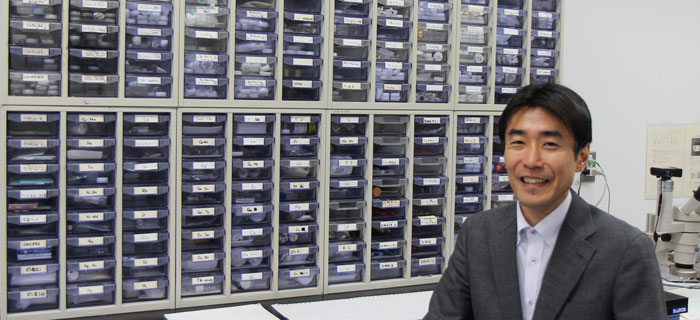
The interview series of "What We've Found Particularly Good About HU" proudly shares with you what's wonderful about Hiroshima University.
A university that nurtures and is nurtured by its students
For me, Hiroshima University is the place where I reached a turning point in my career as a researcher. It is a university where students and faculty members have a very close relationship. I myself am blessed with opportunities for personal growth, as I learn a lot through everyday discussions with my students.
I spent my student years at other universities and have also experienced working at companies and research institutes in the private sector. Up until now, I always felt a certain amount of pride that I had been engaged in research, but I didn’t do much so-called “study”. However, when I came to Hiroshima University, I began valuing the process of learning by thoroughly reading the textbooks that I use in my classes, because the open attitudes and positive reactions of my students made me want to address their queries and answer to their questions properly.
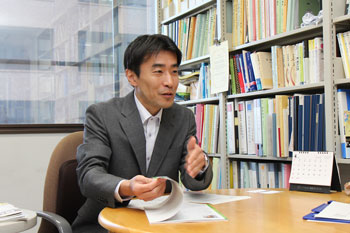
This has made me go back to basics and relearn the fundamentals. I feel that accumulating this knowledge has helped to reinforce the foundations of my research and is generating positive outcomes for me. If I had dedicated myself solely to research, I might have been inclined to develop a narrower perspective. That is why being in this environment, where the students and I can communicate well as we apply ourselves diligently and learn from each other, is so important to me.
Innovation that taps into the University’s outstanding technical capabilities
Every day, I am inspired not only by my students, but also by the university’s staff and other faculty members. My experimental research involves measuring the properties of substances and the synthesis of new materials, and it is often necessary to manufacture measuring equipment and components within the university. Hiroshima University has a shared facility called the Hiroshima University Innovation Plaza where we can make things for ourselves or ask the technical staff to make them for us. The ability to manufacture in-house items that would be very expensive to buy helps to conserve our research funds, while the Plaza’s outstandingly high technical capabilities ensure that the finished item is ideal for my research. I am grateful for this above all else.
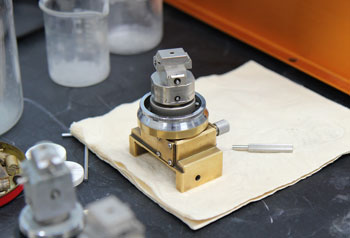
The Innovation Plaza manufactured the height-adjustable base of this goniometer for X-ray diffraction at Professor Onimaru’s request
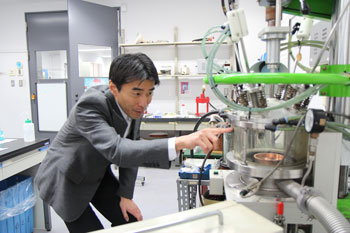
The existing items of experimental apparatus contain many components made-to-order by the Innovation Plaza
An environment capable of fostering initiative and communication skills
I believe that Hiroshima University is a place that nurtures researchers. Torn between finding employment and pursuing research, some students give up on the idea of going on to a doctoral program. What can researchers do for students? What messages can we give them? These are everyday issues for us.
While I do not know whether it will help, a few years ago I started up a residential program for students in my laboratory. We go and stay somewhere for a few days in June or July, before we get busy with graduate school entrance examinations. Planned by the students themselves, the program features research presentations and seminars. The students do everything from deciding on the venue and the themes of the presentations, to compiling a booklet of presentation abstracts. Faculty members do not ask any questions during the presentations; instead, senior students serve as moderators and the students themselves move the discussion forward. It is almost like a miniature academic society conference.
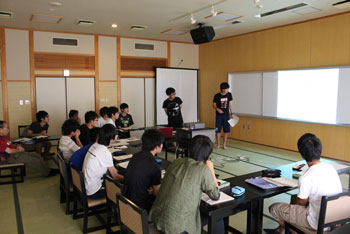
Research presentation at the residential program
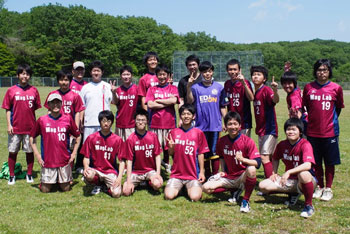
The residential program ends with a soccer tournament in which everyone wears matching strips!
I believe that the communication among the students has improved further since the launch of this residential program. Before that, students tended to split up into groups that seemed to align only with their research themes, but after the residential program, I began to see a change in their attitudes. For example, they were more willing to ask questions to more senior students who were studying different research themes. I hope my students gain a great deal of positive experiences at Hiroshima University that will enable them to spread their wings and achieve success in the future. I believe that Hiroshima University has the perfect environment for this.
Profile
Graduated from the Faculty of Science, Tokyo University of Science. Successfully completed a master’s program at the Graduate School of Science, Tohoku University. Worked for Kyocera Corporation. Successfully completed a doctoral program at the Graduate School of Science, University of Tokyo. Appointed to his current position in 2018 after being a researcher at the Japan Science and Technology Agency, and a research associate, assistant professor, and associate professor at the Graduate School of Advanced Sciences of Matter, Hiroshima University.
Overview of Research
Specializes in condensed matter physics, which uses quantum mechanics and statistical mechanics to understand the distinctive properties of substances, such as magnetism and superconductivity (the state of zero electrical resistance). Has recently been undertaking experimental research focused on discovering novel substance groups in which the electron orbitals of magnetic ions cause diverse phenomena, such as phase transition and superconductivity, as well as single-crystal synthesis, and the precise measurement of properties at low temperatures. Plans to explore substances that could become the subject of new research in the field of condensed matter physics and to work on developing new functional materials.
(Interview: March 2018)


 Home
Home